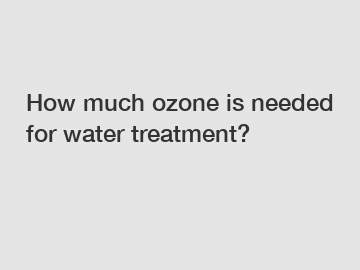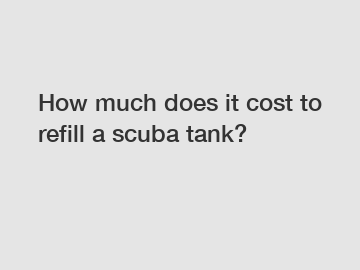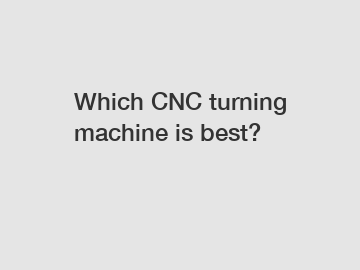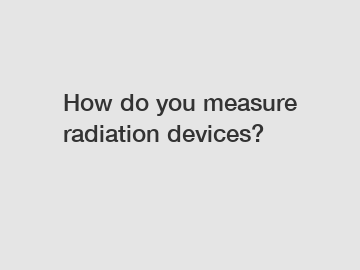How much ozone is needed for water treatment?
How Much Ozone is Needed for Water Treatment?
Water treatment is an essential process to ensure the safety and quality of our water supply. One method that has gained popularity in recent years is ozone water treatment. Ozone, a powerful oxidizing agent, is used to destroy bacteria, viruses, and other organic pollutants present in water. However, determining the amount of ozone required for effective water treatment can be a complex task. In this article, we will explore the factors that influence the dosage of ozone needed for water treatment.
Factors Influencing Ozone Dosage.

1. Water Quality:
The quality of the water being treated is a crucial factor in determining the ozone dosage. The presence of contaminants, such as bacteria, viruses, and organic matter, will require higher levels of ozone to effectively treat the water. Additionally, the water's pH level and temperature can also affect the ozone's effectiveness. Higher pH levels and colder temperatures generally require higher doses of ozone.
2. Desired Treatment Goals:
The treatment goals of a specific water treatment facility will also influence the required ozone dosage. For instance, if the facility aims to achieve a high level of disinfection, a higher dosage of ozone will be necessary. On the other hand, if the primary objective is taste and odor removal, a lower dosage may be sufficient.
3. Contact Time:
The contact time is the duration for which the water is in contact with the ozone. Longer contact times often result in higher levels of disinfection. However, determining the optimal contact time can be challenging as it depends on various factors, including the water flow rate and the size and configuration of the treatment system.
Methods for Determining Ozone Dosage.
1. Bench-Scale Testing:
Additional resources:Which Hydraulic Pump is the Best Choice?
What is the difference between a PhD and a ThD in theology?
How to choose the best Board Loader for ultimate purchase satisfaction?
Revolutionizing Construction: Electric Excavators in Romania
Ultimate Guide to Heavy Duty Forklifts
What is the best aluminum for enclosures?
What Is the Difference Between Oil Burning and Oil Consumption?
Bench-scale testing involves conducting small-scale experiments to determine the appropriate ozone dosage. This method allows for cost-effective and efficient assessment of the required dosage for a specific water source.
2. Pilot-Scale Testing:
Pilot-scale testing involves using larger treatment systems to simulate real-world scenarios. This method provides a more accurate representation of the actual treatment process. It allows for the evaluation of ozone dosage under different operating conditions and effectively identifies the optimal dosage for water treatment.
3. Mathematical Modeling:
Mathematical modeling involves the use of computer simulations to predict the required ozone dosage. By inputting various parameters, such as water quality data and treatment goals, the model can estimate the optimal ozone dosage.
Importance of Accurate Ozone Dosage.
Determining the correct ozone dosage is crucial to ensure effective water treatment. Insufficient dosages may result in inadequate disinfection, leaving harmful pathogens or contaminants in the water. On the other hand, excessive ozone dosage can lead to the formation of harmful by-products, such as bromate or aldehydes. It is therefore essential to accurately calculate the optimal ozone dosage for each water treatment facility.
Contact Us.
If you have any further questions or require assistance regarding ozone water treatment and determining the suitable ozone dosage for your water treatment facility, please do not hesitate to contact us. Our team of experts is dedicated to providing tailored solutions to meet your specific needs.
In conclusion, the dosage of ozone required for water treatment depends on various factors such as water quality, treatment goals, and contact time. Determining the optimal ozone dosage is essential to ensure effective disinfection while avoiding the formation of harmful by-products. If you require assistance or have any questions regarding the ozone dosage for your water treatment facility, feel free to get in touch with us.
For more information, please visit 150g ozone generator, ozone generator for agriculture, ozone generator for aquaculture water treatment .
Additional resources:How do I choose a carton for inspection?
What machine uses wire to cut steel?
Revolutionizing Efficiency: Glue Dispenser Machine - Worth it?
Revolutionizing Offshore Drilling Safety: Annular BOPs - How?
Ultimate Guide to Fruit Packing Machines: Efficiency, Cost, and Maintenance Explained
What are the cons of induction heating?
How to Fix a Broken Hinge: 5 Tips for Handling the Leading Issue?
208
0
0
Related Articles
-
187
0
0
-
188
0
0
-
157
0
0
-
160
0
0
-
170
0
0
-
159
0
0
-
164
0
0
-
Revolutionizing Safety: Are Tracked Aerial Lifts Game Changers?
**Q: Revolutionizing Safety: Are Tracked Aerial Lifts Game Changers?
200
0
0









Comments
All Comments (0)